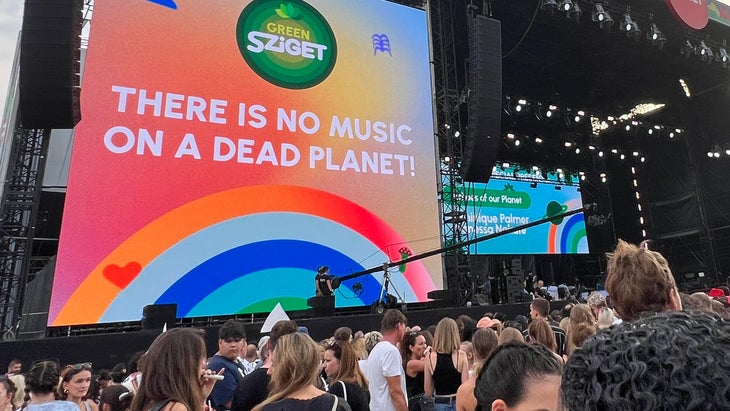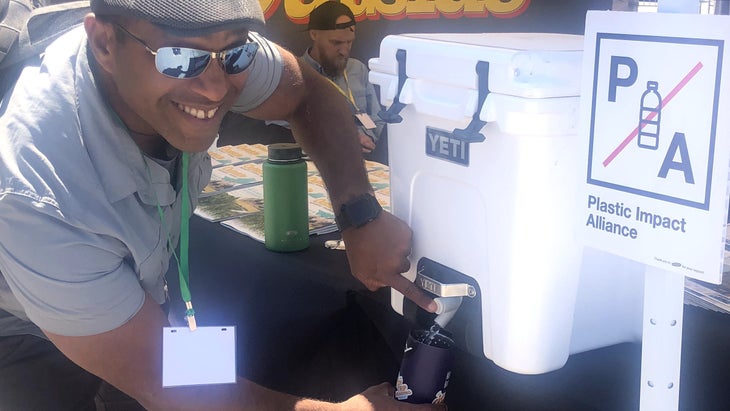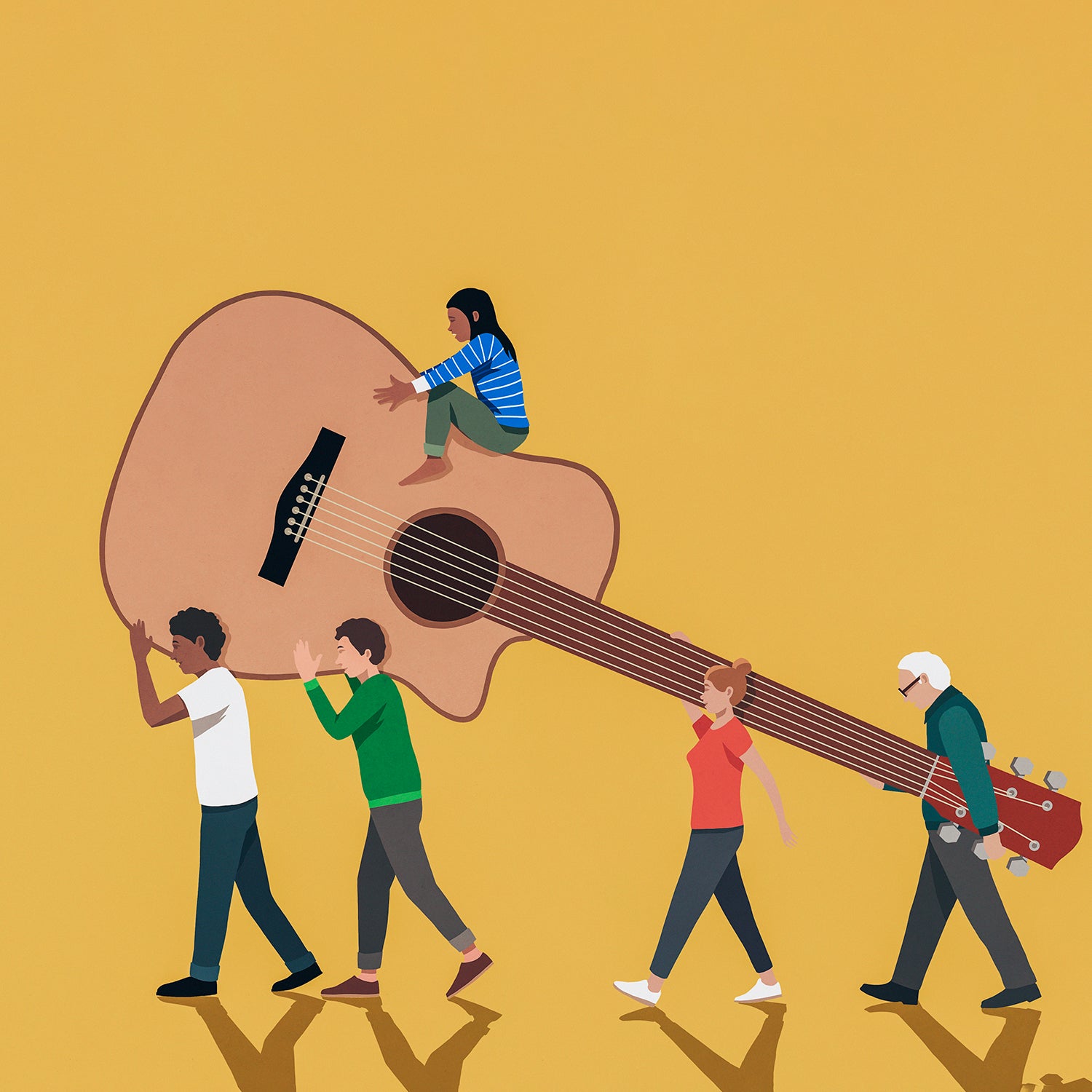Festivals, concerts, sports games, and all kinds of other summer events are an undeniable blast, and I highly recommend them. After all, what’s not to love? Great music in the great outdoors, tasty food, live art installations, and a groovy community vibe. But big live events come with a hefty environmental cost—perhaps you’ve or of all the trash left behind after a concert is over. Is it possible to bring the Leave No Trace mindset to our festival jam?
This notion has been top of mind for me for more than six months now, because I’ve been working like mad to help launch the first-ever in Denver, Colorado, on June 1-2.

I may be a little biased, but The �����ԹϺ��� Festival is sure to be a damn good time with incredible musical talent, inspiring outdoor films, amazing speakers, and a that includes everything from cold plunges to yoga classes to rock climbing competitions and so much more. There will be great eats from local food trucks, a wide array of craft beer and cocktails (both alcoholic and non-alcoholic), and some of the best outdoor brands showing off their latest stuff. It will be a true celebration of the outdoor community.
As �����ԹϺ���’s head of sustainability, my role in launching this event has been making sure it adheres to the principles of Leave No Trace, and pushing our entire team and supply chain to make the event as environmentally-friendly as it can be. Turns out, that’s a tall order, and my odyssey into event management and festival production has enlightened me about the impact that fun events like these sometimes have on the planet.
Essentially, music festivals and other big events are like pop-up cities—they have power grids, utilities, services, a workforce, and finite resources. It’s just that all of these are temporary, and will they will be dismantled in just a few days’ time.

“The most sustainable event is one that doesn’t happen, but what fun is that?” says Jonah Geschwind, CEO of , a company that builds impactful and interactive environmental programs for live events. Green Disco is one of our strategic partners at The �����ԹϺ��� Festival, managing our ambitious data collection process so we can fully understand everything from our emissions to our waste diversion rates.
“A world with no live music and no community gathering—that’s not a world I want to live in,” Geschwind continues. “So the question is: how can we make festivals a force for good? How can we leverage festivals—through experience and discovery—to change fans’ behaviors at the event and get them to take those practices back into their everyday lives? And how can we, as fans, support Leave No Trace festivals?”
In that spirit, I dialed up some of the experts I’ve been working with on the �����ԹϺ��� Festival to give me their best tips on how we, as fans, can get our summer festival groove on while reducing the harm we cause to the planet. All these tips apply equally to any big event you choose to attend, whether it’s a Taylor Swift concert, a Boston Red Sox game, a Renaissance fair, a boat convention, a marathon, or even a summer carnival with the kids.
How To Leave No Trace at Festivals
There are a lot of things you ������’t control about the impact of your day, night, or weekend of fun, but there are plenty of things you can do to make a difference. “How you get there, what you bring, what you consume, and how you engage with other fans are all things to think about,” says Geschwind.
Choose Your Festival Wisely
We’ve all been to events that triggered our environmentalist gag reflex: trash everywhere, thousands of plastic bottles scattered about, traffic jams, and people being inconsiderate of each other and their surroundings. Thankfully, decorum is changing in the events world. Many organizers are paying attention to the environmental costs of their extravaganzas, and working towards cleaner, gentler, Leave No Trace festivals.
“Sustainability is directly tied to human health,” says Jocelyn Gan, sustainability consultant and North American lead for A Greener Future (AGF), a nonprofit focused on enacting positive environmental change in large live events. “Events are a great platform for sustainability discussions. People are already there to experience something new, broaden their knowledge, and meet new people. Event organizers should be leveraging that to educate and engage with them on sustainability.”
But how do you know if the event you want to attend is committed to going green? You can get a really good sense of how sustainable an event is by checking out its website. Does it have a that prioritizes these values and lays out their initiatives? If if doesn’t, that’s a red flag and signals that sustainability is not a priority. Be prepared for what could be a cringy environmental experience.
If your chosen event does have a sustainability page, spend some time on it so you can go into the event being the most sustainable festival fan you can be. Does the event have a waste diversion program or goal? Does it have a single-use plastic policy? Does it provide water refill stations and encourage you to bring your own bottle? Does it source green energy or offset its emissions?
“The principals of Leave No Trace extend beyond wilderness adventures. They apply to any endeavor, ,” says Dean Ronzoni, director of corporate development at Leave No Trace. “Adopting sustainable practices like repackaging food and using reusable products helps to ensure we leave no trace behind. But it all begins by planning ahead and seeking knowledge about what you can bring into the event and what should be left at home.”
Travel Sustainably
Why sit in traffic and pay big fees for parking when there are other options that are cheaper, easier, and have a far lighter environmental impact? According to a recent , audience transport is the single largest source of emissions for festivals.
For the �����ԹϺ��� Festival, we’re aiming to understand our audience’s travel impact through an incentivized two-minute travel survey, so we can engage with our fans and educate them on better options, but also so we can offset those emissions after the event.
“If you’re traveling to an out-of-town festival, choose accommodations that allow you to walk, ride, or take public transportation to the event,” says Geschwind. “If you’re local, consider riding your bike. Just make sure the event offers bike parking and don’t forget to bring a lock.”

Bring Your Own Water Bottle
There are a million reasons to stop buying bottled water—the waste, the cost, and the health impacts are just a few. The �����ԹϺ��� Festival is going single-use plastic free, and like many events and venues, we’ll offer clean, cool filtered drinking water. So no matter where you go, be sure to bring your own bottle so you can say no to plastic.
Pro tip: When entering a venue, make sure your bottle or hydration system is empty.
Be Smart About Waste
Recycle. Compost. Trash. Sometimes it’s hard to know where to toss the remnants of your lunch. Take a moment and read the signage. If it’s unclear, ask. If you still don’t know, put it in the trash, rather than “wishcycle” it which can contaminate the stream.
“Festivals and events produce huge amounts of waste,” says Geschwind. “The sustainable festivals are trying to divert most of it from the landfill through recycling and composting, but the average waste diversion rate across U.S. festivals is only 30 percent, which means 70 percent goes to the landfill.”
At The �����ԹϺ��� Festival, we’ll have our Green Team posted up at the waste stations to help you sort your trash and answer any sustainability questions you might have. Be sure to give them a high five if you see them!
Leave No Trace at Camping Festivals
We all know “pack it in, pack it out” is the rule in the backcountry. The same goes for festivals. But when out-of-towners fly in for a camping festival, they sometimes buy cheap stuff at big box stores. At the end of the weekend, the stuff is gross and dirty and some festival attendees don’t want to deal with bringing it home and cleaning it, so they leave it, resulting in a massive amount of waste.
I was astounded to learn that this year: tents, sleeping bags, clothing and furniture, coolers, and more.
There are far better solutions:
- Bring your own (the financial and environmental cost of checking an extra bag with camping gear far outweighs that of buying new stuff for one weekend).
- Rent what you need at the destination. Check at the local gear shop or consider , which is a massive, national rental program that offers just about everything.
- If you must buy stuff that you don’t intend to bring home, please don’t leave it behind for someone else to deal with. Donate it to a local charity.
Eat Smart
Did you know that the carbon footprint of ? When faced with an array of food trucks, look for locally sourced plant-based meals that will have the lowest carbon footprint.
And be conscious of the packaging and extras. Tell the server to skip the lid and condiments if you don’t need them. Don’t grab a stack of napkins if you only need one. It seems minor but it adds up! If 10,000 people used one napkin instead of five, that would save 40,000 napkins.

Consider a Second-Hand Outfit
For some festival-goers, getting dolled up is a big part of the fun. But that can create an environmental train wreck. One recent study found that single-use outfits for music festivals account for per year. Go ahead and have fun with your outfit if that’s your jam, but try not to buy new.
“Lean into thrifting, clothing exchanges, and upcycling rather than fast fashion. It’s one of the biggest emission reduction actions you can take,” says Kelci Zile, chief development officer for , a nonprofit that leverages the power of live events as a catalyst for climate action. “The identified the fashion industry as the third largest polluter contributing over ten percent of worldwide emissions annually, far more than all of air travel which is around three percent. Plus, thrifting and upcycling saves you money.”
Popular party items like glitter and glow sticks—almost always made of plastic—are also synonymous with festivals. Resist them: they might offer a few minutes of fun, but then they’re just trash.
You’ll also likely be offered lots of junky swag at big events. Before you accept a sticker, coozie, or keychain, consider whether you’ll really use it. At the �����ԹϺ��� Festival, we’ve asked all our vendors to sign an “aGREENment,” promising to limit swag, promotional items, and giveaways, as well as unnecessary packaging, unless pre-approved. Our hope is that this will get people to focus more on the experience rather than the stuff, while limiting waste.
Pro tip: if there’s a chance of rain, bring a jacket so you don’t have to buy a cheap plastic poncho.
Demand Change and Be an Advocate
“If fans demand change, events will listen,” says Geschwind. If there’s a survey, take it, and ask for the changes you want to see, like better waste diversion, no single-use plastic, sustainable merch, or more green energy. Send the festival an email and show them that environmental concerns matter to you and implore them to step up their game.
Also, peruse the nonprofit booths at the events you attend. Sign petitions that align with your values, ask about volunteer opportunities, and support these groups in any way you can. At the �����ԹϺ��� Festival, we will have a cohort of incredible nonprofits all passionate about outdoor access and climate action, and they’d love to meet you!
Join Us at The �����ԹϺ��� Festival
If you dig great music, exceptional films, innovative gear, and just generally vibing with the larger outdoor community, please join me at The �����ԹϺ��� Festival, June 1-2, 2024 in Denver, Colorado’s Civic Center Park.
For ticket, lineup, and other information, visit . �����ԹϺ���+ members receive exclusive access to VIP concert viewing, food and drink at a private hospitality tent, and other benefits at the festival.
Doing right by the planet can make you happier, healthier, and—yes—wealthier. �����ԹϺ���’s head of sustainability, Kristin Hostetter, explores small lifestyle tweaks that can make a big impact. for her twice monthly newsletter or write to her at climateneutral-ish@outsideinc.com.


